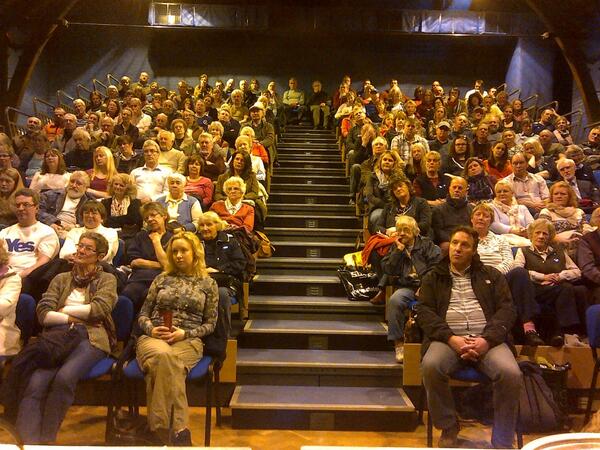
I'd say somewhere between 100 and 150 people.
Now why do I ask that question?
Because Ken Gowans, who is apparently an SNP Councillor for Inverness South posted it on twitter with the claim that he had been delighted to chair "a huge meet" (for Yes) and offering this as pictorial evidence.
Now, I like a good, Labour organised, "public" meeting as much as the next Labour person. It allows us to "rail" against the Tories or the SNP dependent on the nature of the event. But we don't lose sight of the "us" in that. For the "us" invariably includes the vast majority of the audience. It is unlikely any Tories or Nationalists will be there to be railed against in person, or at best they will only be there to rail back. It is even less likely that any members of the general public will be in attendance: partly because they don't particularly warm to railing; partly because if they really want to watch railing they can easily find some superior quality railing on the telly; but chiefly because they are not that interested.
Now there will be exceptions. Citizens who attend such events to inform the rest of the audience that we are all being poisoned by the fluoride in the water or indeed that Princess Diana is still alive and being held captive by the SAS/Mossad/the Martians (delete to taste).
We recognise that as the price of democracy. Or at least as the price of "public" meetings.
But for at least thirty years, sophisticated political movements have clocked that, while "public" meetings might have a role in cheering up your own activists, they have literally no impact on the wider public. That's not to confuse them with televised rallies. Such events do have a (limited) role but only for the very reason that they will be televised. Even then, they are fraught with the "Sheffield" potential.
Which is why I am genuinely bemused as to the strategy of Yes Scotland in this regard. To find (let's be generous) 150 people in Inverness interested in going to a public meeting apparently addressed not only by Fergus Ewing and Dennis Canavan but also by the leader of the SNP group on the local Cooncil and a woman called Michelle Thomson is not a remarkable achievement. After all, 72,000 people live in Inverness. What is remarkable is the delusion that being able to attract one person in five hundred from the local population is somehow something to boast about. And that's even before you include the faithful from elsewhere who no no doubt also attended, perhaps genuinely interested to hear from prominent members of their own side, but also "inadvertently" apparently "swelling" the number of actual Invernessians truly present.
I was amused by a photograph two or three weeks back of a similar public meeting in Renfrew, equally "huge" and equally boasted of with a photo on twitter. For it featured prominently among the audience a pal of mine, wee Brian Lawson. Now, I've known Brian since school. We enjoy to this day a mutual devotion to St Mirren football club where we will pass the time quite amicably. But Brian is not a member of the public; he is the leader of the SNP Group on Renfrewshire Council! So if he really needs to be persuaded to Yes then Nationalists are in even more trouble than I realised.
And, by the way, Brian is not from Renfrew. He is from Paisley. That's why he supports St Mirren.
Yet these "public" meetings are clearly not isolated events. Robin McAlpine boasted in the Scotsman last week that in the previous month he had addressed eighteen such events. Dennis Canavan on twitter announced he was to do another five in the next fortnight.
Now, on one view, all of this is harmless. No doubt if we could line up a few Better Together luminaries for a public meeting in Kilsyth I would toddle along myself.
The difference is that as I sat with my comrades from the Labour Party in the audience, even, for the occasion, showing some goodwill to the few local Tories and Libs also no doubt in attendance, I wouldn't for the moment delude myself that I was among the "public".
For the public would be at home watching Eastenders or the football.
There is however something slightly worrying about the reaction of some to these Yes Scotland jamborees.
It is developing a cult of the "true believer", already getting wound up by the idea that "so many" people have attended these meetings that defeat on 18th September will in some way be not a true expression of the "will of the nation".
So, if I did have one final thought it might be this. That there must be a resolution among the more sensible of those organising these events to remind their audience that Scotland will speak at the ballot box on September 18th. And that, once we have, that will be the end of it.